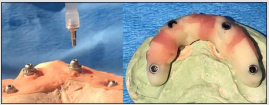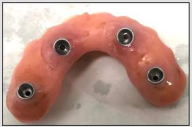Simplified Correction Of Overcontoured PMMA Interim Prosthesis
by: Nemer Hussein, CDT
Problem –
Even with guided surgery, in some cases, the resultant implant position will result in an overcontoured interim prosthesis. When this occurs, patients often will complain about speech problems and irritation from the overcontoured part of the prosthesis. (Figure 1)
Figure 1: (a) Pre-op image prior to extraction of mandibular teeth, (b) lingually overcontoured PMMA prosthesis (green circle).
Solution –
Step 1: Instead of fabricating a new PMMA prosthesis, a modified conversion may be completed. On the original master cast, more ideal angled abutments may be selected (buccal version). A placement jig maybe fabricated to allow ideal intraoral abutment placement. (Figure 2)
Figure 2: (a) More ideal abutment selection and positioning, (b) placement jig.
Step 2: After the new abutments are inserted, a chairside conversion (new abutment pick-up) is completed (Figure 3)
Figure 3: Chairside pick-up with more ideal angled abutments
Conclusion –
A simplified chairside technique has been discussed to correct an overcontoured PMMA interim prosthesis due to non-ideal implant positioning. Instead of fabricating a new PMMA prosthesis, more ideal angled abutments were placed and the prosthesis was converted to a more ideal contour. Always verify the complete seating of the abutments via intra-oral radiographs. If in doubt of the passivity, complete a new scan in case a new PMMA is required at a later date. (Figure 4)
Figure 4: (a) Existing lingual positioned implants or abutments (green arrows), (b) Chairside conversion with more ideal angled abutments.





